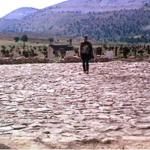Here’s a lovely, fascinating little sermonette from Walter Brueggemann: “The God of the Other (Amos 9:7).”
I’ve read and re-read this chapter countless times without ever catching — or getting caught by — the verse that Brueggemann highlights here and its implications. The speaker here, according to Amos, is none other than God, who says:
Are you not like the Ethiopians to me,
O people of Israel? says the Lord.
Did I not bring Israel from the land of Egypt,
and the Philistines from Caphtor and the Arameans from Kir?
At the simplest level, this is the lesson Mister Rogers taught us: That you are precious and special and infinitely loved. And that so is everyone else.
But there’s a lot more going on, or a lot more that needs to be unpacked from that. Brueggemann argues that here, in one of the earliest and oldest texts of the Hebrew scriptures, we have the same argument for radical inclusiveness that folks like me have made based on New Testament passages from Acts or Galatians. Brueggemann is famous as a scholar and academic, but he’s preaching here, and this’ll preach:
Israel remembered its emancipation from slavery in Egypt under Pharaoh, and imagined that God’s Exodus deliverance of Israel was a singular act without parallel in the history of the world. After all, God had identified Israel as “my first born son” (Exodus 4:22). But Amos, to the contrary, insisted otherwise. He asks of Israel two rhetorical questions. The first question requires a “yes” from Israel. Yes, Israel is like the Ethiopians. That must have been a surprise and a shock to Israel, to hear itself compared to Ethiopia, a nation of “people of color.” Amos challenges the exclusionary self-understanding of Israel. In his second rhetorical question Amos probes the meaning of the Exodus deliverance with the verb, “bring up from,” that is, “set free from.” Yes, God did bring up Israel from Egypt; without a doubt! Everyone knows that. But then two other claims:
Yes, YHWH did bring up the Philistines from Caphtor.
Yes, YHWH did bring up the Arameans (Syrians) from Kir.
Amos names two foreign peoples that were at different times Israel’s most threatening enemies, the Philistines and later the Syrians. He dares to say that God enacts “Exoduses” for Israel’s enemies. He affirms that God’ emancipatory power extends to other peoples who are not commonly taken to be “chosen.” He debunks Israel’s claim to the exclusionary love and justice of God, and insists that in universal scope YHWH’s emancipatory reach extends everywhere, at many times, and in many places, bringing emancipation for those not yet liberated. Indeed, he suggests that the wide sweep of history under YHWH is a sequence of Exoduses, so that there is nothing exclusionary about Israel’s emancipatory memory or claim.
There it is: “YHWH’s emancipatory reach extends everywhere, at many times, and in many places, bringing emancipation for those not yet liberated.”
The topical “tag” for that idea here is labeled “Acts 10” because our initial discussions of it here arose from the “God hates shrimp” arguments and my attempts to rebut the idea that this story of Peter welcoming outsiders was merely meant to teach us to be exclusionary bigots who get to eat bacon cheeseburgers.

We’ve made the same biblical case here, repeatedly, arguing for the ever-expanding “emancipatory reach” of God based on Philip the Evangelist, based on Paul’s angry, relentless argument for that in Galatians, and based on the book of Jonah.
That Jonah stuff is particularly important because it illustrates that this idea of God’s ever-expanding emancipatory inclusion is not some New Testament innovation requiring the creative revisionism of the Apostle Paul. The book of Jonah was written centuries before the birth of Jesus or of Paul, and it was written — explicitly and ferociously — as a polemic against the idea that God’s children are “not like the Ethopians” or the Philistines or the Arameans or the pagan sailors or the Ninevites. The presence of this argument in the Hebrew scriptures is important because it means we don’t need to skip off into some supercessionist understanding of Pentecost or Paul to affirm the argument Brueggemann makes above.
Walter Brueggemann is kinder and gentler than the author of the book of Jonah, but he’s making the same argument for the boundless love of God, ever expanding and ever including. The straw-man caricature of Jonah represents and embodies the exclusive opposite idea of religion, the cramped ingratitude that gets so possessed by the first half of Mister Rogers’ lesson — “I am precious and special and infinitely beloved” — that it cannot accept the essential second part of it (“And so is everyone else”).
Both sides of this argument can be found in our Bible. The book of Ezra ends with a horrifying mass-divorce and mass-abandonment of children as Ezra demands the purification of Israel by the casting out of Moabite wives and half-Moabite children by the thousands. The book of Ruth is a little novella of a scripture written in rebuttal to that. The various royal genealogies scattered throughout the Bible — up to and including those in the Gospels — take sides in this argument by including Ruth in the lineage of David.
This claim (or aspect of reality) may be more of an obstacle for my white evangelical friends than what Brueggemann calls the “yes” of God that “counters all of our fearful exclusions.” The idea that there are arguments and oppositions within the scriptures means that you can’t just flip-and-point to a random verse or pluck one out of a concordance and be assured that it will provide a clear and specific answer to all your questions. And if that clear and specific answer is not so easily available, then we might be reading something wrong. If you imagine that your eternal salvation is dependent on your never reading anything wrong, then this idea is terrifying. The horror of that possibility makes you reject any suggestion that the Bible may speak with the voices from many sides of many arguments, or that it may contain stories with unreliable narrators. (This is why white evangelical readings of Jonah — a wholly unreliable narrator — are so tortured and strange.)
The fascinating thing about the passage Brueggemann highlights here is that the book of Amos was written a very long time before the book of Exodus was. Amos 9:7 presents one side in an argument about the meaning of the Exodus, showing us that both sides of this argument existed centuries before the book of Exodus itself was written. Amos is one of the oldest books in the Bible — possibly the oldest — so the tension between the two sides of this argument date back to the very beginning.
That argument continues today. Skip ahead a few verses from where Dr. Brueggemann left us and you’ll come to Amos 9:11-12 — verses cited in the book of Acts as the early Christian community struggled to grasp this notion of God’s boundless love. For those of us who read the Bible in English translation, there’s something very odd about that passage in Acts, which we discussed here a while ago:
Acts 15 tells us about an argument among the leaders of the early church over the status of Gentile believers. James gets up and speaks in favor of including these unclean outsiders in the community of believers. He quotes the Bible in support of this position: “This agrees with the words of the prophets, as it is written, ‘After this I will return, and I will rebuild the dwelling of David, which has fallen; from its ruins I will rebuild it, and I will set it up, so that all other peoples may seek the Lord.’”
He’s quoting there from the book of Amos — Amos 9:11-12. But here’s the odd thing: according to the book of Amos in our Bible, he’s quoting it wrong.
Keep one finger there in Acts 15 and turn to that passage in Amos in the same Bible you’re holding there in your hands. You won’t find what James says there in Amos. Instead, you’ll read something like this: “On that day I will raise up the booth of David that is fallen, and repair its breaches, and raise up its ruins, and rebuild it as in the days of old; in order that they may possess the remnant of Edom.”
That’s not the same at all. That says the opposite of what James says it said.
James is there in Acts 15, claiming that Amos 9:11-12 tells us that the dwelling of David will be built up “so that all other peoples may seek the Lord,” but when we turn there ourselves we find Amos saying, instead, that the dwelling of David will be built up so that David’s people “may possess the remnant of Edom.”
One choice offers a radically inclusive view in which Israel was chosen so that salvation could come to every last person on earth. The other choice offers a radically exclusive view in which Israel was chosen so that it could utterly vanquish every last remnant of its enemies.
And they’re both right there in the same Bible. You’ve got one finger stuck in a passage defending one choice and another finger stuck in a passage defending its opposite. And these conflicting meanings don’t even come from two different passages — they come from the exact same two verses. What gives?
This specific disparity between our English translations of Amos and the text of the prophet that James was reading is partly due to the difficulty of translating ancient writing that didn’t have vowels. The ambiguity faced by translators, though, is also due to the presence within and throughout the scriptures of these two very different understandings of God.













